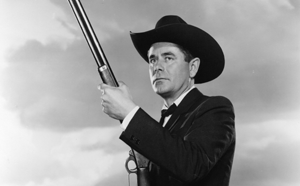Glenn Ford died today at age 90, and I’m sorry. A good life he had. But let’s be honest and admit the basic facts. Ford broke through with Gilda (1946), but his face and manner seemed a bit too young and smooth back then — he lacked character. He had taken some on by the time he starred in Fritz Lang ‘s The Big Heat (1953), and from then until the mid ’60s he was “Glenn Ford”.

Then his career eased down and stayed that way until the end 40 years later. He worked through the ’70s and sporadically in the ’80s, but Ford never aged or devel- oped into my idea of an especially rich or dynamic man — he didn’t ripen. Ford was always a reasonable middle type fellow. Being fierce and volcanic was never in his quill.
He conveyed steeliness and repression at times, but Ford was mainly about middle-class attitudes and presumptions, soothed feelings, “there, there” and thoughtful, average-guy decency. He peaked with lead perfs in movies like The Blackboard Jungle (’55), Teahouse of the August Moon (’56), 3:10 to Yuma (’57), The Cowboys (’58) , Cimarron (’60) and Pocketful of Miracles (’61) . His last really tight and tangy role was as a cryptic San Francisco detective in Blake Edwards ‘ Experiment in Terror (’62).
At the risk of sounding disrespectful (which I’m not trying to be), Glenn Ford does- n’t travel in today’s culture. He hasn’t for decades. He’s a 1950s man, and that era doesn’t figure into anyone’s consciousness any more.









